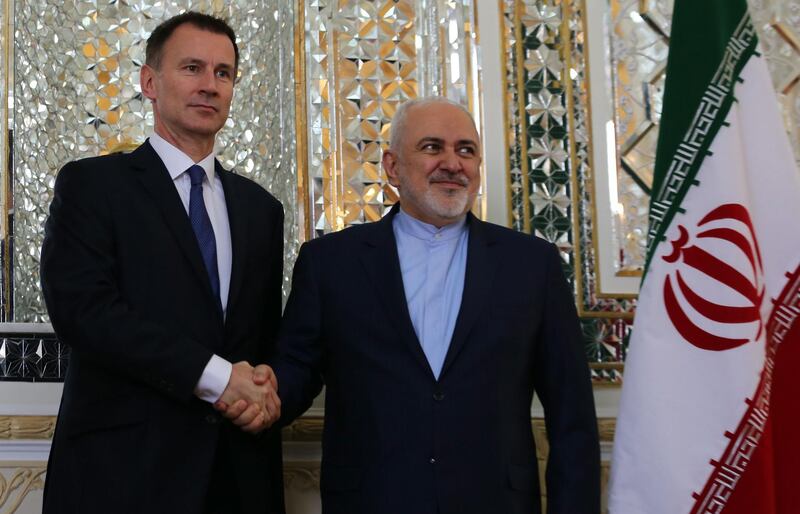Like a generation or more of western diplomats before him, British Foreign Secretary Jeremy Hunt flew to Iran this week in the vain hope that he could establish a dialogue with the regime's so-called moderates.
Yet, as is so often the case when naivety takes precedence over reality, Mr Hunt left Tehran without securing any of his major goals: namely the release of dual Iranian-British citizen Nazanin Zaghari-Ratcliffe, whom Britain believes has been jailed on false spying charges, or winning Iranian support for diplomatic efforts to end the Yemen conflict.
This will have been very disappointing for Mr Hunt as, for once, a British foreign secretary travelled to Iran with genuine prospects of being able to achieve a breakthrough.
The Iranians, after all, are desperate to establish a dialogue with the West following the recent implementation of Washington’s new round of sanctions in an effort to persuade Tehran to renegotiate the controversial nuclear agreement it signed in 2015, which the Trump administration says is deeply flawed.
In this context – and on paper at least – Britain has much to offer. Together with Germany and France, the British government is refusing to follow the US in scrapping the nuclear deal and, at the risk of causing further tensions with Washington, is supporting a European Union initiative to allow firms to continue trading with Iran.
But while the the EU is desperately looking for a legal mechanism to offer protection to European companies to maintain trade ties with Iran, many major firms have already withdrawn from the Iranian market over concerns that they, by continuing to trade with Iran, they might find themselves subjected to punitive American fines, as well as being denied access to lucrative American markets.
Even so, the very fact that Britain has taken such a high profile and risky step in resisting the US-led boycott of Iran meant that Mr Hunt was afforded a warm welcome in Tehran, where he enjoyed a long meeting with his Iranian counterpart Mohammad Javad Zarif. Moreover, such was the Iranians’ desire to make an impression on Mr Hunt that he was given the rare privilege of meeting the Secretary of the Supreme National Council, Ali Shamkani, a key figure in Iran’s hardline military establishment who rarely agrees to see visiting western dignitaries.
But while all the atmospherics appeared positive, Mr Hunt’s attempts to achieve any significant progress on the key issues he raised was less successful. His desire to persuade Tehran to take a more constructive role in diplomatic efforts to resolve the Yemen crisis met with the – by now familiar – dissembling that the crisis was not of Iran’s making and that its people were not involved in the fighting, and had most definitely not supplied the Houthi rebels with the arms and missiles that are regularly used to attack targets in Saudi Arabia.
Such claims, of course, fly in the face of the incontrovertible evidence that Iranian missiles have been used to attack Saudi targets, including Riyadh international airport, while the shiploads of Iranian arms that flow into rebel-held areas have helped to sustain the Houthi offensive on key areas, such as the port of Hodeidah.
Iran has also been blamed for the failure of previous diplomatic efforts to resolve the Yemen crisis by pressuring the Houthis not to accept the terms of UN-sponsored peace deals.
Nonetheless, Mr Hunt valiantly sought to persuade the Iranians to back the latest round of UN peace talks scheduled to take place in Stockholm next month.
Some of the language Mr Hunt used to attract the Iranians’ attention was decidedly apocalyptic, with the foreign secretary describing the Middle East as a “tinderbox”, where one small miscalculation could lead to a global catastrophe on the scale of the First World War.
The use of such hyperbole is nothing new for Mr Hunt, who recently faced criticism for comparing the EU to the USSR.
With Britain taking a lead role in the Yemen-related negotiations at the UN, it is incumbent on Mr Hunt to get Tehran to be more cooperative. But rather than winning Iranian backing for the diplomatic process, Mr Hunt merely received a list of Iranian demands that the Saudi-led coalition must first cease its military campaign, a stipulation unlikely to find favour while Saudi Arabia is still being subjected to Iranian-supplied missiles.
Even more disappointing for Mr Hunt will have been his singular failure to make any progress in securing the release of Mrs Zaghari-Radcliffe, who is now spending her third year in an Iranian prison cell for crimes she and her family insist she did not commit.
Mr Hunt made some scathing criticism about the way she had been treated, as well as a number of other British dual nationals believed to have been held on trumped-up charges by the regime.
“If Iran has a policy of detaining dual nationals as a tool of diplomatic leverage, then there will be consequences,” he warned. “We will not let them get away with it scot-free. They have to understand that this is not a sustainable situation.”
Yet despite his stern language, Mr Hunt's efforts to make progress on Mrs Zaghari-Ratcliffe's case achieved little, save for a private visit to her family, where he met her four-year-old daughter Gabriella.
Otherwise, he was blocked every turn. Mr Zarif explained that he had no authority to interfere in decisions taken by the judiciary, which is controlled by the hardliners in the Iranian regime. A request to talk to a senior judge failed to materialise, as did efforts by Mr Hunt to visit her in prison.
For, as Mr Hunt has now discovered, when it comes to any issue in Iran, whether diplomatic, military or humanitarian, it is the hardliners who always call the shots, leaving the likes of so-called moderates like Mr Zarif completely impotent to influence events.
Con Coughlin is the Daily Telegraph’s defence and foreign affairs editor





